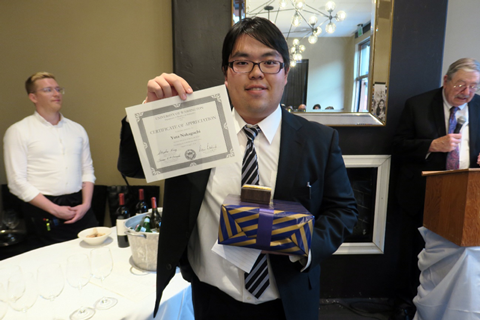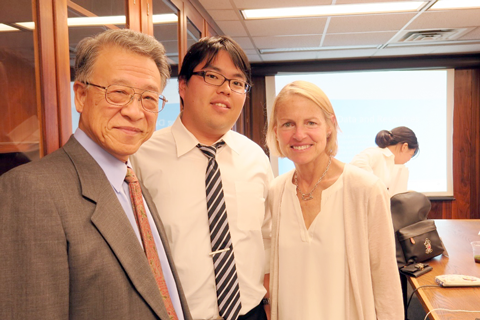国際・国内交流
中口 雄太さん(第5学年次)
ワシントン大学での研修を終えて
約1週間、シアトル・ワシントン大学医学部にて生命倫理を学ぶ機会を頂きました。海外で勉強する機会は初めてで、特に医療の最先端であるアメリカで倫理問題についての講義を受け、考える機会は大変貴重でした。講義に関しては、内科学から公衆衛生学まで多岐にわたり、それぞれの分野で権威ある先生方に講演して頂きました。また、ワシントン大学医学部やSeattle Children’s Hospital、Seattle Cancer Care Alliance、Northwest Kidney Centerなど、多くの施設見学もさせて頂きました。以下では、多くの講義の中から特に印象に残ったことを述べさせて頂きます。まず、臓器移植における倫理問題があります。講義では臓器移植についての歴史と現在、そして未来について様々なことを教えて頂きました。やはりアメリカでの移植治療は日本より進んでおり、アメリカではより多くの命を救うことが出来ると感じました。しかし急速に発展したために、解決出来ていない倫理的問題があります。例えば、心停止後の移植については迅速な対応が求められますが、ご遺族に早急な判断を強いることは大変心が痛みます。ですが、時間が経つと臓器の機能が失われてしまうため、ここに大きなジレンマが存在します。医療現場には、他にも様々な場面で患者や家族に意思決定を強いる場合があります。しかし当然ですが、その場ですぐに判断できるはずがありません。そこで医師は、可能な限り早い段階で意思決定が必要になる可能性を患者に事前に伝えておくことが必要です。そして、意思決定に必要な情報をメリット、デメリット共に全てを伝えなければなりません。医師には常に先を見通す力が必要であると切に感じます。次に、アメリカには“Chaplain”というspiritual careを専門とする職業があることを初めて知りました。日本人には、spiritual=宗教という考えが少なからず存在します。しかしChaplainは宗教的な仕事ではなく、患者の精神的なサポートを行い、人としての価値を見出し、苦悩や痛みを取り除くことを主な仕事としています。このような職業は日本には存在しませんが、終末期の患者や日々ストレスを抱えて働いている人など、非常に多くの需要があると思います。日本でもアメリカでも、残念ながらまだまだホスピスを始めとする終末期医療に対するマイナスイメージが残っています。しかし、「死」についての考え方や受け止め方には日本もアメリカも大きな差はないと感じます。死を恐れ、痛みを避けたいと考えるのは人類共通であり、医師がspiritualな部分に関わることは必要不可欠です。全ての医師がspiritual careを専門にするのは難しいですが、Chaplainのような職業の方と患者を結びつけることは可能です。
そして、やはり尊厳死について考えることが今回の研修でのポイントの一つであったように思います。ワシントン州は全米で7州しかない、尊厳死が法律で認められている州です。尊厳死を認めるためには多くの決まりが必要ですが、その中でも注目すべきなのは必ず患者自身が自分で薬を服用しなければならないという事でしょう。もし家族や友人が薬を飲ませてしまうと殺人になってしまい、たとえ手が不自由な患者であったとしても自分で薬を飲まなければなりません。ここに、尊厳死の最終判断は患者自身で行うことで患者の意思決定を尊重していることが見受けられます。また、患者が自ら薬の袋を開けることで考えが改められることもあり、薬の処方受領者と死亡者の数に相違があるのでしょう。尊厳死の是非については様々な意見があると思いますが、私はやはり患者の意思を尊重するという点で尊厳死に対して肯定的です。アメリカでは人口最大の州であるカリフォルニア州でも尊厳死を認める法案が可決され、これから世界の情勢が大きく変化することは間違いありません。日本でも尊厳死についての理解が深まり、積極的な討論が行われることを期待します。
1週間という大変短い期間でしたが、多くの倫理問題を認識し考えることが出来ました。研修全体を通して感じたことは、倫理問題において国境は存在しないということです。医療を提供する上で医療者側と患者側で考えの相違は必ず生じます。そして患者の考えはひとりひとり異なります。その中でひとりの患者と真摯に向き合うためには、まず患者の考えや起こっている倫理問題をきちんと理解し、常に倫理問題について考え続けることが何より大切だと思います。医療技術は日進月歩のため、伴う倫理問題も日々変化していきます。常にアンテナを張り、先を見通す力もまた必要でしょう。そして、やはり英語力の重要性が身に沁みました。ワシントン大学の先生方は心優しい方ばかりで、私の拙い英語に合わせて簡単な英語でお話し頂き、申し訳ない気持ちで胸がいっぱいになりました。また、日本は非常に狭い国であり、多くの分野において世界に遅れをとっています。欧米の最先端の知識や技術を学び、コミュニケーションを取るツールとしてやはり英語は欠かせません。世界の約70億人を診療するためには英語が話せないと話になりません。今回は通訳の方がいらっしゃいましたが、自分の意見をきちんと伝えるためには、自分の言葉で伝える必要があります。私は、今回の研修を自身の英語力向上のきっかけにしなければならないと強く感じました。
最後になりましたが、このような機会を提供して頂きました枚方療育園の山西理事長をはじめ、団長の関先生や中野先生、富田先生、そして多くのスタッフの方々に感謝の気持ちを申し上げます。今回の研修を一過性のもので終わらせないよう、これからより一層精進して参ります。後輩達のためにも、ワシントン大学での研修が来年度以降も継続されますことを切に願っています。本当にありがとうございました。

